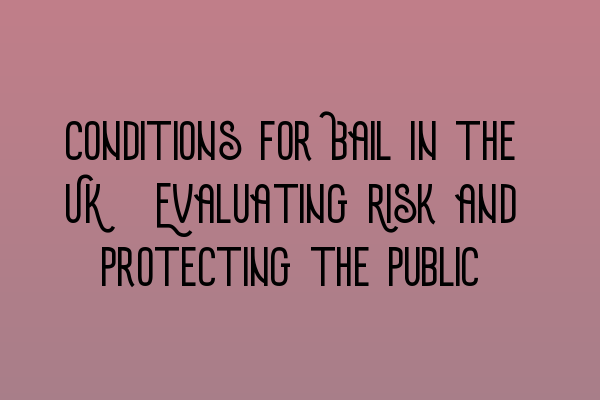Conditions for Bail in the UK: Evaluating Risk and Protecting the Public
When it comes to criminal law cases in the UK, one crucial aspect that often comes into play is the granting of bail. Bail is the conditional release of a defendant awaiting trial or sentencing. It is aimed at ensuring the defendant’s presence at future court appearances while also protecting the public from potential harm. In this blog post, we will delve into the conditions for bail in the UK, evaluating the risks involved and the measures taken to protect the public.
The Importance of Bail
Bail plays a significant role in the criminal justice system as it allows individuals to be released from custody while awaiting trial. It is based on the fundamental principle that individuals should be considered innocent until proven guilty. By granting bail, the court acknowledges that there may be valid reasons for a defendant to be released before the resolution of their case.
However, the court’s primary concern when granting bail is assessing the risk involved. The court must balance the right to liberty with the protection of the public and the prevention of reoffending. To achieve this delicate balance, certain conditions are imposed on the defendant to mitigate risks.
Evaluating Risk
When considering bail, the court evaluates various factors to determine the level of risk posed by the defendant. These factors may include:
- Past criminal history – Previous convictions or pending charges can be considered when assessing the risk of reoffending.
- Seriousness of the offense – The nature and severity of the alleged crime may impact the decision to grant bail.
- Flight risk – The likelihood of the defendant fleeing and not attending future court appearances.
- Threat to the community – If the defendant poses a danger to the public, bail may be denied or granted with stringent conditions.
Based on the evaluation of these factors, the court will impose appropriate bail conditions to address identified risks.
Bail Conditions
Bail conditions are set by the court to ensure the defendant’s compliance and to protect the public from potential harm. These conditions can include:
- Restrictions on travel – The defendant may be required to surrender their passport and/or abide by travel limitations.
- Residence requirements – The defendant may be ordered to live at a specific address or report regularly to a police station.
- Curfew – A curfew may be imposed, restricting the defendant’s movements during specific hours.
- Electronic monitoring – The use of electronic tags can be employed to monitor the defendant’s whereabouts.
- Restraining orders – In cases involving potential harm to specific individuals, a restraining order may be issued.
These are just a few examples of the conditions that may be imposed. The specific conditions will depend on the circumstances of each case, with the aim of addressing the identified risks effectively.
Protecting the Public
One of the primary purposes of bail conditions is to protect the public. By imposing restrictions and measures, the court aims to minimize the risk of further criminal activity and harm to others. The court considers the potential danger that the defendant may pose to society and tailors the conditions accordingly.
Moreover, the imposition of bail conditions serves as a deterrent for potential offenders. By showing that there are consequences for breaching the conditions, the courts hope to discourage individuals from reoffending while on bail.
Conclusion
Conditions for bail in the UK are carefully evaluated to strike a balance between the defendant’s right to liberty and the protection of the public. Through assessing various risk factors, the court determines appropriate conditions that mitigate potential dangers.
If you want to learn more about the SQE Criminal Law & Practice in the UK, feel free to explore our related articles:
- SQE 1 Practice Exam Questions
- SQE 1 Practice Mocks FLK1 FLK2
- SQE 2 Preparation Courses
- SQE 1 Preparation Courses
- SRA SQE Exam Dates
At SQE Criminal Law & Practice Law UK, we provide comprehensive resources and preparation courses to help you achieve success in your SQE exams. Stay informed, stay prepared!
